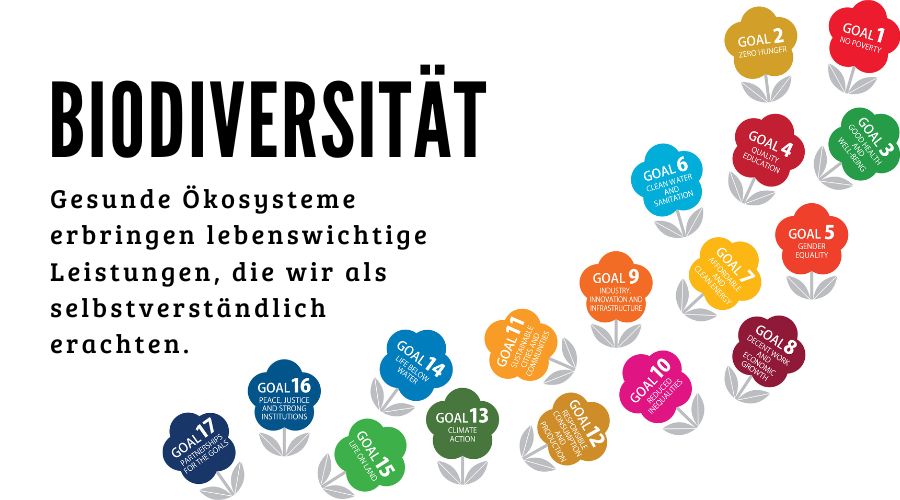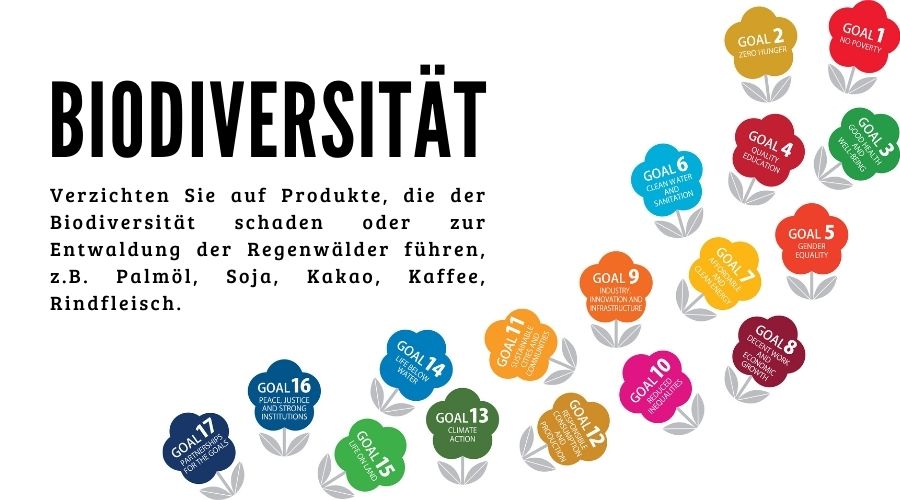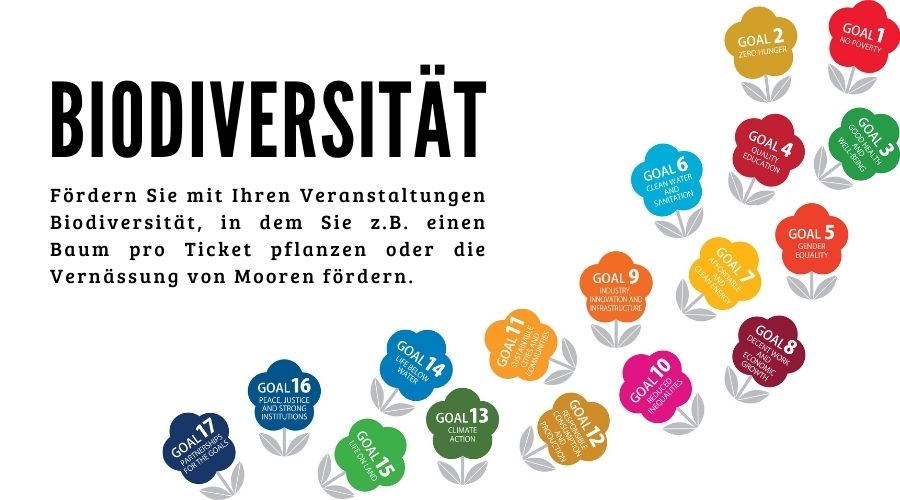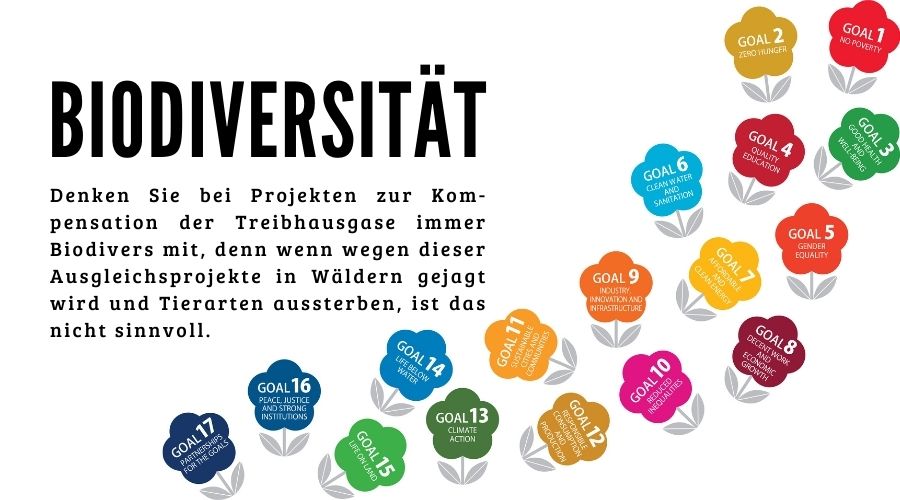Why biodiversity is so important
The current catastrophic loss of biodiversity is, next to climate change, the greatest threat to humanity and thus the greatest challenge for governments and economic systems worldwide. The players in the event industry can make a positive impact in this regard. After all, the promotion of biodiversity is the basis of human life and at the same time the prerequisite for any economic activity.

Step 6 of the 16 Steps Initiative: Biodiversity
The initiative "16 Steps to 2025 - For a climate-neutral event industry" presents its sixth step: "Promoting biodiversity". The initiative provides information on why the promotion of biodiversity is so important for the economy and society and what solutions the event industry - as the sixth largest sector of the economy - can contribute.
The idea behind the 16 Steps Initiative is to lead the industry and all stakeholders involved in the event industry step by step to climate neutrality by 2025. To this end, comprehensive background information is being prepared for each step and made available free of charge on the initiators' websites. Associations, networks and media in the industry have free access and are encouraged to inform their networks about this and set them up for the future.
This time the initiators are particularly alarmed and formulate an urgent appeal. On 22.05. 23 initiator Stefan Lohmann announced the 6th Step already at the Impact Creator Panel at IMEX as an official supporter of the initiative. Stefan Lohmann, expert for live entertainment and sustainability in the event industry and one of the 16 Steps Initiator:in explains: "When creating the background information for the sixth step of our initiative, it turned out that the promotion of biodiversity will be perhaps the most important step. This is because biodiversity is the basis of human life. The current rapid loss of this threatens humanity worldwide. This is supported, among others, by the IPCC report of the Intergovernmental Panel on Climate Change, Dr. Frauke Fischer (lecturer, author), Mike Keller (lecturer and operator of the Market Hall Hamburg) and the decision of the 15th World Conference on Nature (CBD COP 15) in Montreal.

The threat is massive and real. Swift action is now required. "In this regard, we see the event industry in a special position and responsibility. Through its actions and its enormous reach, the industry has the opportunity to make sustainability tangible, tangible and self-evident for millions of people and can thus create a positive impact. ", Lohmann adds. "What is desirable is to create a positive tipping point with the support of government, academia and business, moving from being part of the problem to part of the solution."
What can the event industry contribute to biodiversity?
The EU Parliament writes: "Healthy ecosystems provide vital services that we take for granted. Plants convert the sun's energy and make it available to other life forms. Organic matter is broken down into nutrients by bacteria and other creatures, providing plants with healthy soil to grow in. Pollinators, in turn, are essential for plant reproduction and ensure our food production. Forests and oceans are carbon sinks. The water cycle relies heavily on living organisms. Good air, clean water, and quality soils depend on the biodiversity of our planet. Biodiversity helps us fight climate change and reduces the impact of natural hazards."
"Because living organisms interact in dynamic ecosystems, the disappearance of one species can have far-reaching effects on the food chain."

The EU identifies these main causes of biodiversity loss:
- Land use changes (e.g. deforestation, intensive monocultures, urbanization).
- direct exploitation of resources such as hunting and overfishing
- Climate change
- Pollution
- invasive alien species
The 16 Steps Initiative identifies these key action areas for events:
- Procurement / supply chains
- Energy
- Mobility
- Catering / Gastronomy
- Water / Waste water
- Waste
- Location
- Communication
Concrete solutions for all stakeholders in the event industry:
- Align your own business activities in a sustainable, climate-positive and biodiverse way.
- Refrain from products that harm biodiversity or lead to the deforestation of rainforests, e.g. palm oil, soy, cocoa, coffee, beef.
- Choose and enforce sustainable and deforestation-free service providers at events, e.g. locations, caterers, shuttle, hotel, technology, etc.
- Forego cut flowers and switch to local organic produce.
- Reduce and set building and pathway lighting to LED and warm white light up to 3,000 Kelvin. This way insects will not be attracted.
- Reduce the use of resources and switch to reuse and recycling. This also saves energy and CO2. Do without e.g. print materials, disposable materials, giveaways etc. and thus counteract deforestation and reduce waste.
- Separate waste. Think also about bio-waste, reuse and recycling and thus reduce the amount of waste and ensure recycling as humus or in biogas plants.

- Promote biodiversity with your events, e.g. by planting one tree per ticket, promoting the rewetting of moors and paying attention to biodiversity, e.g. in cooperation with nature conservation organizations.
- Understand the value of ecosystem services.
- Perform a risk and materiality analysis.
- Reduce negative impact and increase positive impact with your events.
- Switch to green power and pay attention to conservation.
- Prepare CO2/climate accounting including scopes 1 through 3.
- Analyze and monitor deforestation-free supply chains to protect and promote biodiversity; especially rainforests.
- Train your employees and offer appropriate training.

- Actively participate in standards development, e.g., associations, policy, chambers of commerce, etc..
- Reach out to managers and demand binding action.
- Also speak to your politicians and demand that they adhere to the agreements of the Paris Climate Agreement and the World Conference on Nature.
- Actively support environmental organizations.
- Always think biodiverse when it comes to greenhouse gas offset projects, because if there is hunting in forests and extinction of animal species because of these offset projects, it does not make sense.
- Promote sustainable communication with all stakeholders to implement the sustainability strategy - this includes promoting biodiversity.
- Artists, speakers, presenters who champion the issue can and do provide further awareness and outreach.
- Network, collaborate and invest in sustainability.
- Publish your sustainability strategy.

About the initiative "16 Steps to 2025 - Towards a Climate-Neutral Event Industry
More about the initiative "16 Steps to 2025 - For a climate-neutral event industry" and the complete press release can be found at pressebox.de
> to the official press release - step 6
> Download press release - step 6
> to all press releases of Stefan Lohmann
> 16 Steps to 2025 - For a climate-neutral event industry
Get the practice guide:


